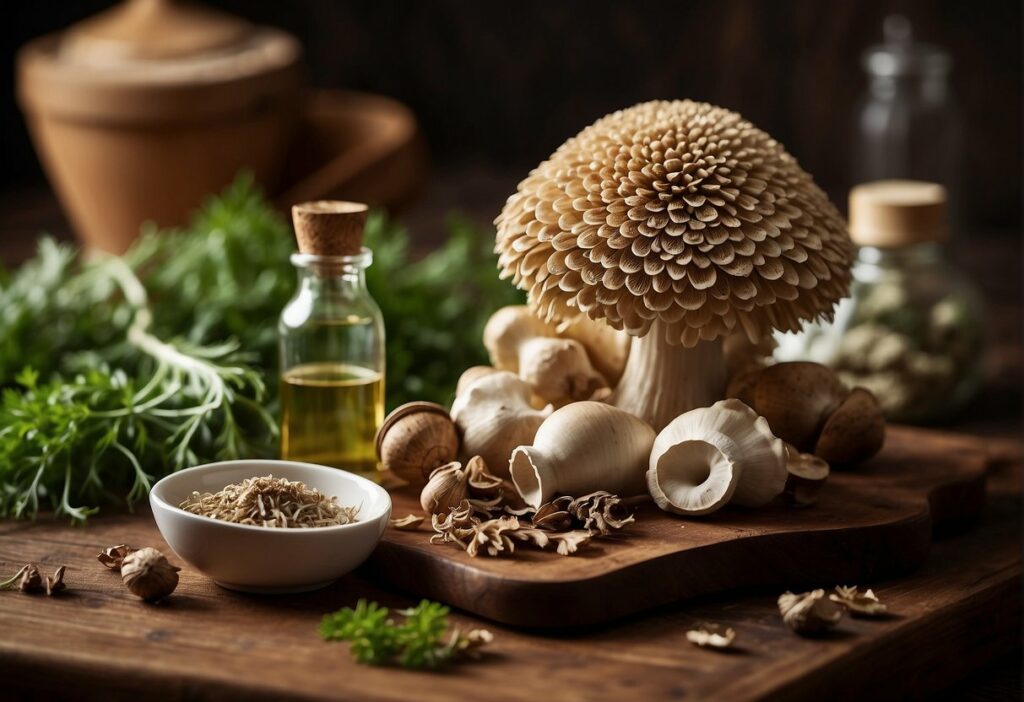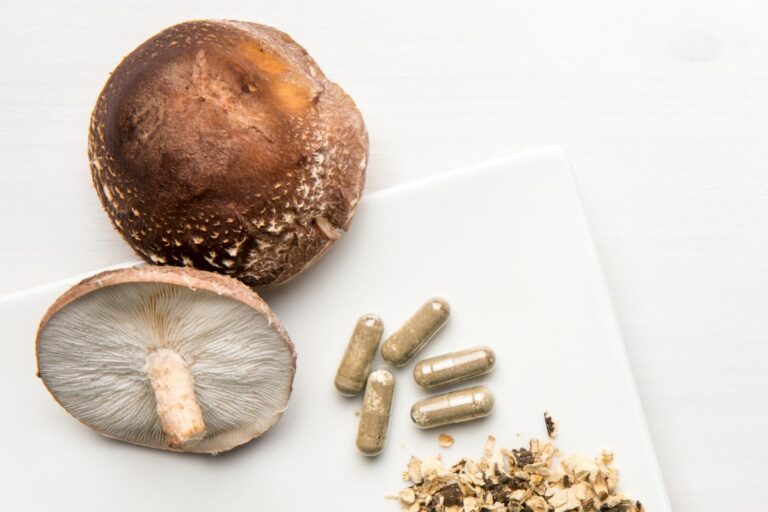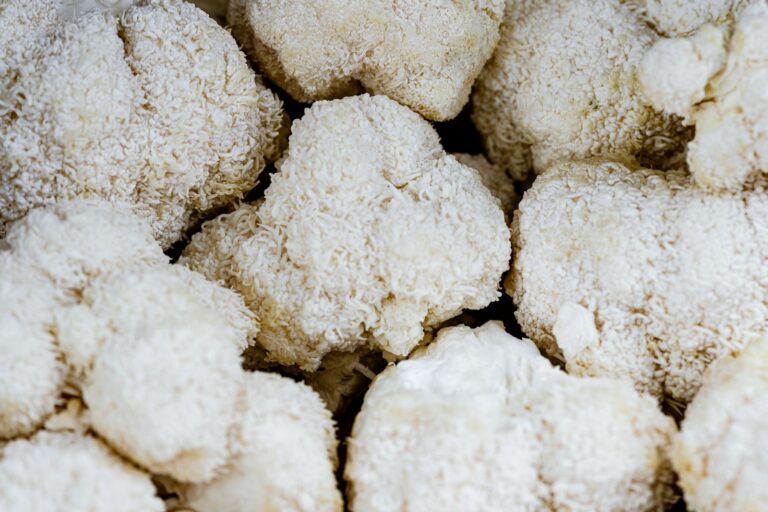Maitake mushrooms, scientifically known as Grifola frondosa, are not only prized for their rich, earthy flavor but also for their health-promoting benefits. If you’re exploring ways to enhance your well-being through natural remedies, you may find maitake mushrooms to be a valuable addition to your regimen. These fungi have been used in traditional Eastern medicine for centuries and are gaining recognition in Western health circles for their potential therapeutic properties.
Among their numerous purported health benefits, maitake mushrooms are known for their ability to support immune function. This could partially be due to their high concentration of beta-glucans, a form of polysaccharides, which are believed to stimulate the immune system and help ward off infections. Moreover, studies have suggested that maitake may have positive effects on blood lipid levels and blood sugar control, making them a point of interest for managing cardiovascular health and diabetes.
Incorporating maitake mushrooms into your diet is more than a culinary delight; it’s a step towards embracing a food that may contribute to your overall health. Whether you are looking to support your immune system, control blood sugar levels, or just enjoy nutritious foods, maitake mushrooms might be worth your consideration. As research continues to unfold, the potential health applications of these mushrooms could broaden, offering you a natural complement to your health-focused lifestyle.
Nutritional Profile
Table of Contents

| Nutrient | Amount |
|---|---|
| Calories | ~31 |
| Protein | ~2.2 grams |
| Carbohydrates | ~7.1 grams |
| Dietary Fiber | ~2.7 grams |
| Total Fat | ~0.5 grams |
| Saturated Fat | ~0.1 grams |
| Monounsaturated Fat | ~0.1 grams |
| Polyunsaturated Fat | ~0.2 grams |
| Cholesterol | 0 milligrams |
| Sodium | ~9 milligrams |
| Potassium | ~323 milligrams |
| Vitamin C | ~0.5 milligrams |
| Vitamin D | 0 micrograms |
| Calcium | ~3 milligrams |
| Iron | ~0.6 milligrams |
| Magnesium | ~14 milligrams |
| Phosphorus | ~108 milligrams |
| Zinc | ~0.5 milligrams |
| Copper | ~0.2 milligrams |
| Manganese | ~0.3 milligrams |
| Selenium | ~0.7 micrograms |
| Folate | ~16 micrograms |
| Niacin | ~3.2 milligrams |
| Pantothenic Acid (B5) | ~0.4 milligrams |
| Vitamin B6 | ~0.1 milligrams |
| Riboflavin (B2) | ~0.2 milligrams |
| Thiamine (B1) | ~0.1 milligrams |
Maitake mushrooms are a powerhouse of nutrients, offering a variety of vitamins, minerals, and macronutrients that can contribute to your health. They are low in calories yet rich in several dietary components crucial for your body’s daily functioning.
Vitamins and Minerals
Maitake mushrooms are notable for their impressive range of vitamins and minerals. They are a good source of vitamin D, which is essential for bone health and immune function. They also contain significant amounts of potassium, which is necessary for heart and muscle function. Niacin, or vitamin B3, found in maitake, supports digestive health and nerve function. Other key minerals present in these mushrooms include phosphorus, important for the formation of bones and teeth, magnesium, which is involved in over 300 biochemical reactions in your body, copper, vital for iron absorption and blood cell formation, and zinc, important for immune system function and DNA synthesis.
- Vitamin D: Important for bone health and immune support
- Potassium: Aids in muscle and heart function
- Niacin (Vitamin B3): Supports digestive health, nerve function
- Phosphorus: Essential for bones and teeth
- Magnesium: Participates in numerous biochemical reactions
- Copper: Helps with iron absorption, blood cell formation
- Zinc: Crucial for immune health, DNA synthesis
Macronutrients
When it comes to macronutrients, maitake mushrooms provide a balance of fibers, proteins, and carbohydrates, with a minimal amount of fat, making them a suitable addition to many diets, especially if you’re monitoring calorie intake. The fiber found in maitake is particularly beneficial for digestive health and can aid in maintaining stable blood sugar levels. Proteins are crucial as they are made up of amino acids, which are the building blocks of your cells, muscles, and tissues. While maitakes aren’t a significant source of carbohydrates, the ones present in these mushrooms are complex and contribute to the overall feeling of satiety.
- Fiber: Supports digestive health, aids in blood sugar regulation
- Protein: Provides essential amino acids for cell and muscle health
- Carbohydrates: Complex carbs for energy and satiety
Health Benefits

| Health Benefit | Description |
|---|---|
| Immune Support | Contains beta-glucans, compounds known to support immune function |
| Antioxidant Properties | Rich in antioxidants that may help combat oxidative stress |
| Anti-Inflammatory Effects | Some studies suggest potential anti-inflammatory properties |
| Blood Sugar Regulation | Preliminary research indicates a potential role in blood sugar control |
| Blood Pressure Regulation | Contains compounds that may contribute to blood pressure regulation |
| Cholesterol Management | May help manage cholesterol levels |
| Weight Management | Some studies suggest a role in weight management |
| Antiviral Properties | Research indicates potential antiviral effects |
| Antitumor Activity | Some studies suggest potential antitumor properties |
| Liver Support | May have hepatoprotective effects on the liver |
Maitake mushrooms, also known as Grifola frondosa, are celebrated for their wide range of health benefits. These mushrooms are particularly noted for their potential in boosting immune function, managing cancer and tumors, regulating blood sugar and diabetes, supporting heart health by influencing cholesterol levels, and providing anti-inflammatory effects.
Immune System Support
Maitake mushrooms are rich in polysaccharides like beta-glucans which are known to enhance your immune system. One specific component, the D-fraction, is believed to play a pivotal role in stimulating immune function and potentially acting as an adaptogen, helping your body resist various stresses.
Cancer and Tumor Management
Research has indicated that maitake may have tumor-fighting properties, primarily through its high beta-glucan content. These polysaccharides could help in managing cancer by promoting the body’s immune response against tumor cells. While studies continue, maitake extracts have shown promise particularly in breast cancer therapy.
Regulating Blood Sugar and Diabetes
Integrating maitake mushrooms into your diet may benefit blood sugar regulation. Their role in reducing insulin resistance is noteworthy, suggesting a potential advantage for those managing diabetes. Maitake has been observed to assist in stabilizing blood sugar levels and may contribute to better overall management of the condition.
Heart Health and Cholesterol
Maitake mushrooms have been associated with heart health, owing to their potential to manage cholesterol levels. They could assist in lowering “bad” LDL cholesterol while having a favorable effect on blood pressure, thereby acting as a beneficial food for maintaining cardiovascular health and managing hypertension.
Anti-Inflammatory Effects
The anti-inflammatory properties of maitake may contribute to reducing the risk of chronic diseases associated with inflammation. Antioxidants found in these mushrooms can further bolster your defense against inflammation, promoting better health and possibly aiding in the relief of inflammation-related symptoms.
Maitake in Traditional and Modern Medicine

Maitake mushrooms have a rich history in traditional medicine and are now being substantiated by modern research, particularly for their potential in cancer treatment and immune system support.
Historical Significance
Maitake, known as the “dancing mushroom” in Japan, has been used in Chinese and Japanese medicine for thousands of years. Your ancestors may have consumed maitake to enhance their overall health and treat ailments. Traditionally, people believed maitake could enhance vitality and improve wellness. Japan and China have both featured maitake in historical texts for its medicinal properties.
Current Research and Studies
In recent research, scientists have focused on the bioactive compounds within maitake, such as polysaccharides like beta-glucan. These compounds are being studied for their ability to modulate the immune system. You might be interested to know that several studies, including those conducted on mice, have indicated that maitake extract has the potential to inhibit tumor growth. Clinical trials are further investigating how maitake can be a part of cancer patients’ treatment post-surgery.
Therapeutic Usage
Today, maitake extracts are often used as a supplement. Therapeutically, maitake is being explored for its benefits in boosting natural killer cells, key components of your immune response. Medicinal mushrooms like maitake are gaining attention for their therapeutic usage and support for cancer cells management. Although further clinical trials are needed, the potential for maitake in both complementary and alternative medicine continues to pique the interest of the medical community.
Potential Side Effects and Considerations

When considering the use of maitake mushrooms, it’s important to be aware of possible side effects and interactions. This section will address specific concerns such as medication interactions, allergies, and dietary restrictions.
Medication Interactions
Maitake mushrooms have the potential to interact with certain medications, including those that affect blood clotting. If you are taking anticoagulant drugs, such as warfarin, it’s crucial to consult your healthcare provider, as maitake has been shown to possibly enhance the effects of these medications, increasing the risk of bleeding.
Allergies and Sensitivities
Although uncommon, sensitivities or allergic reactions to maitake mushrooms can occur. Symptoms might include:
- Rashes
- Itching
- Difficulty breathing
If you show signs of an allergic reaction, you should seek immediate medical attention. If you have a known mushroom allergy, it’s advised to avoid maitake.
Dietary Restrictions
You should be cautious about incorporating maitake mushrooms into your diet if you have certain conditions:
- Autoimmune diseases: The immunomodulating effects of maitake could potentially worsen symptoms.
- Breast-feeding: There is not enough research to determine if maitake mushrooms are safe to consume while breast-feeding. As a precaution, it may be best to avoid them.
Always consider these risks in the context of your overall health and consult your healthcare provider when integrating new supplements into your health regimen.
Culinary Uses and Preparation

Maitake mushrooms, known scientifically as Grifola frondosa, offer a rich, woodsy flavor and a firm texture. Rising to culinary prominence for both their delicious taste and nutritional benefits, these mushrooms provide a versatile base for a variety of dishes.
Traditional Dishes
Historically, Maitake mushrooms, also referred to as “Hen of the Woods,” are a staple in Japanese cuisine where they are often simmered in soups or used in stir-fries. Their ability to absorb flavors makes them an ideal ingredient in traditional dishes such as:
- Miso Soup: A simple, yet nutritious broth with Maitake mushrooms, seaweed, and tofu.
- Stir-Fried Maitake: Cooked with a medley of vegetables and a soy sauce-based glaze.
Modern Recipes
Your culinary adventure with Maitake mushrooms can extend beyond traditional uses; they are a contemporary ingredient for modern dishes, which might involve:
- Pasta with Maitake: Sautéed mushrooms served over pasta, enhancing the dish with their rich, earthy taste.
- Maitake Tacos: Diced and sautéed as a filling, these mushrooms add a meaty texture to tacos.
Supplements and Dosage
If you’re not one for cooking, Maitake mushrooms are also available in supplemental forms. Here’s what you need to know:
- Capsules: Often dosed at 300-500mg, taken once or twice daily.
- Dried Maitake: Can be reconstituted for use or powdered and added to foods or drinks.
When considering supplements, always follow the recommended dosage on the product label or consult a healthcare professional.
Frequently Asked Questions
In this section, you will find targeted information about the specific health effects and considerations surrounding maitake mushrooms.
What are the potential benefits of consuming maitake mushrooms for overall health?
Maitake mushrooms are lauded for their ability to support the immune system due to beta-glucans, a type of polysaccharide that has been shown to help stimulate the immune response. Further, a study suggests that maitake can have positive immunological effects in breast cancer patients.
Can maitake mushrooms have an impact on skin health, and if so, what are the effects?
Maitake mushrooms may benefit skin health due to their antioxidant properties, which can help combat oxidative stress, a factor that can contribute to premature skin aging. These mushrooms also contain vitamins B and D, which are important for maintaining skin integrity.
Are there any known side effects associated with the intake of maitake mushrooms?
While maitake mushrooms are generally considered safe to eat, some individuals might experience gastrointestinal upset or allergic reactions. It’s important to start with small servings if you are trying them for the first time.
How can maitake mushrooms affect weight management efforts?
Research involving maitake extracts indicates potential for supporting weight loss. These mushrooms contain fibers that may help in appetite control and fat reduction, thus they could be a supportive component in weight management strategies.
What are the considerations for maitake mushroom consumption regarding liver health?
Maitake mushrooms have been studied for their potential liver-protective effects, including promoting liver health through their antioxidant compounds. This can be particularly beneficial in detoxifying and protecting the liver from various toxins.
When comparing maitake and shiitake mushrooms, what are the differing health benefits?
While both maitake and shiitake contain immune-boosting polysaccharides, they have unique compositions. Maitake is often associated with blood sugar regulation and potential anticancer properties, whereas shiitake may help lower cholesterol levels and also boasts antiviral and antibacterial properties.







